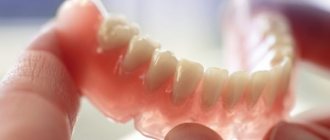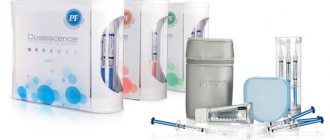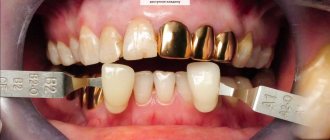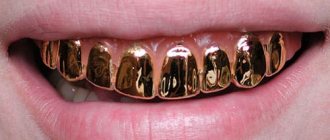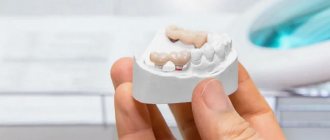Marina Kolesnichenko
Dentist, chief physician of the Beauty Line dental clinic.
There are many ways to defraud patients of money, or, as the victims themselves say, “money scam”: extremely inflated prices for treatment using conventional (sometimes downright cheap and low-quality) materials, imposition of unnecessary services that do not in any way affect the effectiveness of the work, and the most expensive treatment methods. Here there are “promotions”, when they promise a low price, but add to the price tag in small print: “Price from...”. In practice, obtaining a service at such a low cost turns out to be unrealistic. In the most severe cases, the client may find on the bill services that were not provided to him at all.
Let's take a closer look at all these methods and how to protect yourself from them.
They offer to take my word for it
Any treatment, including dental treatment, begins with diagnosis. At the same time, it is important that they not only tell you the problem, but also show it to you. Now technologies make it possible to demonstrate to the patient, using a video camera, areas of the oral cavity that require therapy. If the doctor does not show the diseased tooth during diagnosis, limiting himself to commenting on what he will do and why, there is a possibility of deception. There is a lot of room for fraud here. For example, “find” advanced caries and periodontitis. A pigment spot on the enamel can be passed off as caries; it does not require treatment at all. And for periodontitis, which requires expensive and complex therapy, there is tartar, which is removed using conventional ultrasonic cleaning. The dentist may also make up a diagnosis that is more serious than it actually is. For example, instead of caries, “treat” pulpitis or periodontitis. There have been cases when patients, being deceived by unscrupulous dentists, even lost completely healthy teeth in order to acquire expensive implants,
How to protect yourself
The only option to prevent yourself from being deceived is to control all the doctor’s actions, demanding convincing explanations. Try not to deal with clinics where there are no modern diagnostic tools, in particular a video camera with which a specialist can demonstrate damaged areas of the teeth.
“Material and technical base is an important factor that must be taken into account when choosing a dental clinic,” says Vladimir Shipkov, dentist, owner of the Dr. Dental Center. SHIPKOV dental clinic. “You can’t build a spaceship from car parts, especially with just a Phillips screwdriver.” X-rays, unlike dental CT scans, cannot give a complete clinical picture; implants will always be head and shoulders above clasp and bridge structures; metal-ceramic crowns in beauty, durability and functionality will never compare with highly aesthetic metal-free restorations. What can we say about a laser, with the help of which a doctor can bloodlessly, painlessly, and contactlessly dissect any tissue. Even dental hygienists today cannot do without high-tech assistants—devices with artificial intelligence remove hard and soft dental plaque from hard-to-reach places without damaging the tissue.”
However, ultra-modern technologies, materials and equipment cannot replace the experience, knowledge and talent of a specialist. They can only complement them. “Before entrusting dental treatment to a dentist, make sure that his knowledge, professional skills and practical experience are at a sufficiently high level,” our expert advises. - Today this is not difficult to do: all the necessary information will be provided in the center itself, if, of course, we are talking about a respectable institution with a good reputation. The necessary confirmations can also be found on the Internet. Specialist education, qualifications and duration of medical practice are key decision factors in this context. It is equally important (and sometimes even more) that a specialist constantly improves his qualifications, studies and improves his professional skills; without this it is impossible to become the best in his field. In general, the standard of modern dentistry is a symbiosis of technology, knowledge, skills and equipment, without which today you can’t go anywhere. Poor equipment, along with a lack of personnel and their insufficient qualifications, is almost always a guarantee that dental work will not be performed to the required level.”
How to recognize an unscrupulous dentist
DENTIST TRICKS
Overdiagnosis
This happens even more often than we would like.
The situation looks something like this: you come to treat caries. After a thorough examination, the doctor reports that, in addition to caries treatment, a dozen more procedures need to be performed. Often the doctor treats healthy teeth or recommends removing them to install an implant. It even goes so far as to remove completely healthy teeth.
You need to be alert and know that,
- firstly, a good specialist will tell you in detail about the diagnosis and justify the prescription of certain procedures.
- Secondly, a good doctor will offer several options and describe all the nuances.
examination by a dentist
If you said that expensive options are not available to you, the doctor is obliged to offer an alternative. It happens that after such words the doctor simply loses interest, then it is certainly clear what he needed.
It is clear that sometimes more complex problems are actually revealed during the examination. However, in this situation, the doctor is obliged to explain everything and justify why such procedures are needed.
Non-existent services
This is such a marketing ploy. It is assumed that once a person comes for an appointment, but the required procedure is not available in the clinic. Then he will agree to any alternative, not wanting to waste time looking for another doctor. And it often works.
Patients are not fully aware of what they need and settle for what is available. In such a wrapper you can get a low-quality service and a lot of problems.
Before going to the clinic, it would be a good idea to find out
- does the clinic have the necessary licenses,
- what drugs do doctors use
- and whether they provide the necessary services.
Cheap implants
An implant is a medical product that must have a certificate and safety certificate from the Ministry of Health.
Dental implantation is the most modern method of smile restoration. It should be understood that for this the doctor needs appropriate qualifications and experience. In addition, the procedure requires a number of other materials besides the implant itself. Many people don’t know about this, so they happily go to the clinic where the lowest price is indicated.
However, many clinics use a very simple scheme: they indicate the price of the implant as a separate product.
A patient comes to the clinic and it turns out that he needs to pay more
- for diagnostics,
- surgeon's work
- and additional materials.
Here again, the expectation is that once the person has come, he will not go looking for another clinic.
Whitening teeth by 30 shades
Some doctors take advantage of the fact that patients are not aware of the details of the procedure. Most often this happens when a patient comes for teeth whitening.
The most common way to lure money is the promise of whitening your teeth by 20-30 shades. Of course, people who dream of a snow-white smile will happily agree to such a procedure. But this is from the realm of fantasy.
There is a palette of shades of human teeth, compiled as a result of many years of research. Doctors use this palette when whitening or selecting fillings.
All shades of teeth are divided into 4 groups, and in each group there are several more tones (from the lightest to the darkest).
When whitening, an aesthetic version of the palette is used, where the shades are arranged not in groups, but from light to dark. According to this scale, teeth are whitened by a maximum of 10–12 tones, but not more than 20.
snow-white smile
Consumables
Dentists have a wide range of materials at their disposal:
- from expensive imported
- to cheap domestic ones.
It is impossible to determine the manufacturer of materials by eye, so doctors often deceive and put, for example, a cheap filling, but charge money as if it were an expensive one.
Don't be afraid to ask
- what does a doctor do?
- what materials does it use?
ask to see the boxes.
aesthetic palette option
Intimidation
Perhaps the favorite trick of most doctors. It's similar to the overdiagnosis trick, but even more sophisticated.
For example, you come to an appointment with one problem, but after the examination the doctor tells you that everything is bad and you need to perform a thousand and one more procedures to fix everything.
If you hesitate, the doctor begins psychological pressure. Intimidation, moralizing and persuasion begin. The doctor will definitely tell you a scary story about what will happen if you don’t treat some disease. Of course, anything is possible, but in this case you should not rush into the pool headlong, but should go for a consultation with another doctor.
To avoid such tricks, follow a couple of simple rules
- Firstly, choose a trusted clinic. The method is simple and always works: ask your family, friends or colleagues which dentist is better, and then choose from the options offered. So the chances of encountering unscrupulous doctors are much less.
They hide documentation for materials from the patient.
The clinic is obliged to provide the client with all data on the materials used in the treatment process. But, as a rule, dentists do not do this on their own initiative, and we do not require it. How many of you have at least once asked the dentist to show documentation for the implants and fillings that he is going to install and you are going to pay for? Fraudsters take advantage of the gullibility of patients - they replace expensive materials with cheaper ones. If the clinic staff is unenthusiastic, or even irritated, when a client’s request to satisfy his legitimate curiosity is met, you should know that something is fishy here. The level of service is an important condition for customer loyalty, and any serious, trustworthy institution treats such issues with understanding and scrupulousness.
How to protect yourself
Remember that the client has every right to demand to see what will be used for therapy. If this is a composition for filling, then it will be written on the packaging and on the syringe what material it is, and if it is, say, an implant, ask that it be removed from the packaging immediately before installation and before your eyes.
Check everything that is written on the receipt before you pay for it. The transparency of the dental clinic and the high level of service are a guarantee that you will receive high-quality treatment without overpaying for the services provided.
No. 2. The dentist comes up with a more serious diagnosis instead of a mild one.
For example, instead of caries, the doctor diagnoses pulpitis or periodontitis. How to prevent. There is only one way out - to improve your medical literacy. At least just read about the symptoms of the most common dental diseases. For example, acute but short-term pain in response to eating sweet food or an equally short-lived reaction to cold air are signs of deep caries. In this case, it is not always necessary to remove the nerve. But if the tooth aches a lot, prevents you from sleeping, it hurts to press on it, and the reaction to sweets and cold lasts a very long time, then most likely it is pulpitis and the nerve will have to be removed.
Do not enter into a contract for medical care
Agree, it is difficult to imagine a financial, construction, transport or any other company starting to fulfill a large order before the corresponding contract has been concluded. Why should it be different in dentistry? “The agreement stipulates the rights and obligations of all participants in the process, therefore it is beneficial to both parties, unless, of course, they are initially planning anything illegal,” says our expert. “Having signed papers in hand, the patient knows exactly how much, for what and when he needs to pay, and the clinic receives guarantees of this very payment. And an agreement is also needed to receive a tax deduction, thanks to which the patient can count on cashback from the state.”
How to protect yourself
Treat your teeth in clinics operating within the legal framework. When concluding an agreement for the provision of medical services, keep in mind that it provides for a change in the treatment plan if the situation requires it. But at the same time, you must be warned about this possibility, and the need for changes must be confirmed by diagnostic results. If you have signed a treatment plan, and upon payment you see a bill that exceeds the stated amount, which is justified, for example, by “overconsumption of materials,” you have the right not to pay the difference in cost. In case of objections from the clinic, write a statement to Rospotrebnadzor or the prosecutor's office.
No. 3. Changes old fillings for no reason or removes a tooth just for implantation
How to prevent. Old fillings need to be changed only if they have lost their tightness or are severely worn down in height. Implantation is indicated only if a tooth is missing, and while it can still be cured, it must be preserved by all means. A good doctor will try to restore a tooth, even if only one wall remains. Today there are all the possibilities for this - for example, indirect tabs.
What to do if you are the victim of a medical error?
They offer a loan for treatment
If, after an examination, they announce a serious diagnosis to you and insist on immediate and expensive treatment, most likely they are trying to cynically scam you. Especially when they offer to apply for a loan right there in the clinic for this therapeutic event. Keep in mind that if a dental center constantly employs a specialist in issuing loans, this is an obvious signal that you are in an organization whose goal is primarily to pump money out of patients, and not to treat them.
How to protect yourself
Just stay away from this establishment.
How to avoid being scammed at a dental clinic
Contact trusted clinics
You need to follow the banal advice - rely on reviews from family, friends and colleagues. This way, you will most likely end up in a trusted clinic and in the hands of a good specialist.
Compare prices for services in different clinics
You should compare prices at different clinics or use aggregator sites that offer such comparisons to find out what the average price is for the service you require.
Check licenses and certificates
Before contacting a clinic, you need to study its website: in premium-segment clinics, the high price of treatment is due to the use of top-class materials and innovative techniques, the presence of very highly qualified specialists on staff and often unique experience who develop their own treatment methods. On the websites of premium clinics you can find certificates and diplomas from manufacturers, certificates of advanced training for doctors.
No. 4. The doctor imposes unnecessary procedures and expensive materials.
How to prevent. Question all the information your doctor gives you and ask clarifying questions. Better yet, learn to understand the basics of dentistry yourself. Then it will be clear to you that to treat pulpitis it is not necessary to take a panoramic photograph, which is only needed for prosthetics, or an expensive 3D computed tomography, which is only necessary for implantation. And that whitening teeth before covering them with braces is a waste of money, but remineralization (strengthening enamel), on the contrary, will help protect teeth from caries.
No. 6. The doctor makes additions and forgery
For example, a doctor writes procedures that he did not perform into a check, or exaggerates his labor costs. For example, there is a known case when a doctor took money from a patient for cleaning 6 tooth canals, although there are never more than 4. Also, fraudulent doctors can install implants that are not those that were indicated in the price list, more economical fillings and inlays, well and generally use cheaper materials than what the patient paid for.
How to prevent. Just check everything like an auditor. Examine x-rays, contracts and receipts, request packaging for implants and check whether the serial numbers indicated on the box match those included in the contract and card, and also count the number of fillings and implants installed in the mouth. If you cannot cope with this task yourself, consult another dentist. Take photos of your mouth before and after any procedure. Record the doctor's words on a voice recorder. If something goes wrong, these pictures and recordings will serve as evidence of medical error (or malice).
Read more about how dentists are deceiving you here.
How do they get money?
By the way, this is not just about finances. Sometimes people are forced to pay with their health. And dentists know how to lure money from patients in different ways. How to determine that they want to deceive you? Firstly, they inflate the price by using cheap materials. Very comfortably. How will you check this? Secondly, dentists are trying to force completely unnecessary services on you. Thirdly, they insist on the most expensive methods of treatment. And finally, they try to attract patients with various promotions - ones that no one will ever be able to take advantage of.


